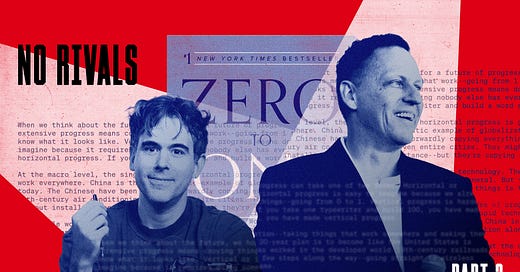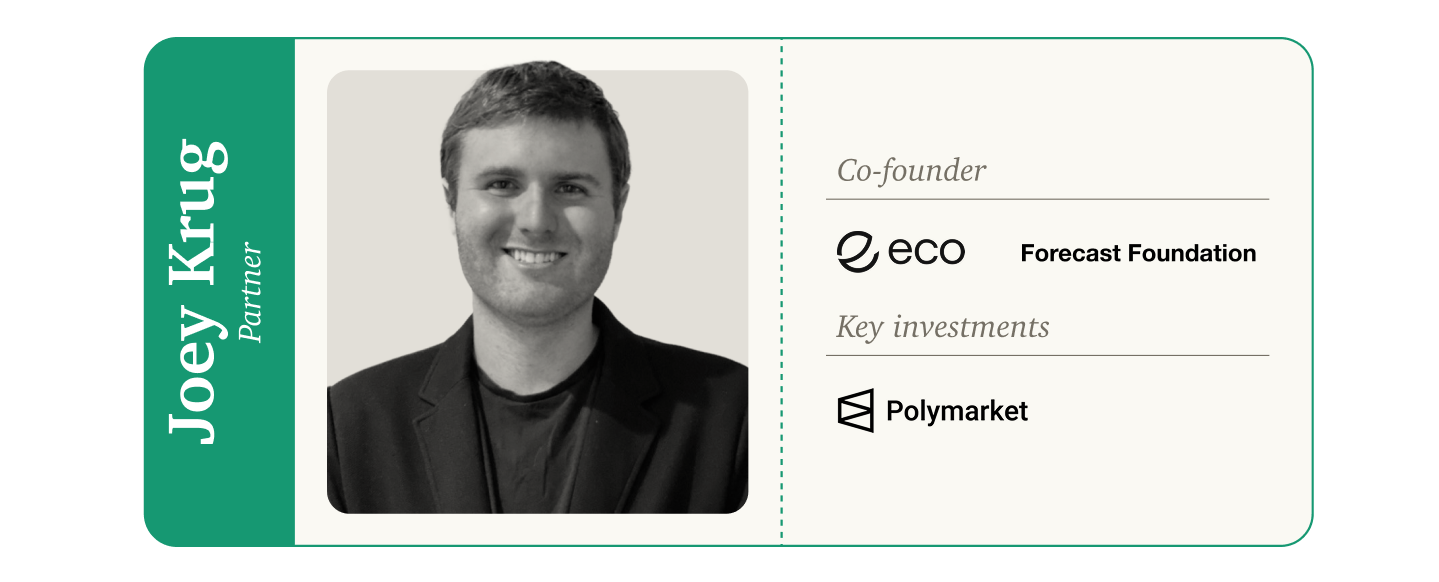The Gospel of Founders Fund
How Founders Fund mastered the art of provocation and rebooted Silicon Valley's intellectual operating system.
“Deep thinking on what makes businesses and firms great.” — Proby S, a paying member
Friends,
Founders Fund is not just a venture capital firm. It is a narrative agent with a gospel to spread.
Through Zero to One, the Thiel Fellowship, and provocative soft power initiatives, Founders Fund exerts a unique influence in Silicon Valley. More than any other actor, it is responsible for venture capital’s contemporary deep tech fervor and nationalistic tenor.
In Part III of “No Rivals,” we discuss Founders Fund’s polarizing gospel and how it has impacted its investing practice.
If you haven’t read Parts I or II yet, you can find them both here:
By a growing margin, the No Rivals series has quickly become the most popular work The Generalist has ever published. Here is what others have said:
“IMHO, this isn’t just a profile. It’s a saga of power, risk, and reinvention at the highest levels of tech investing. A good start for a Netflix series.”
“It was truly a magnum opus. The prose and the fund 👏👏”
“Please turn this into a book!”
“Fantastic weekend read on the origins and inner workings of the enigmas: Peter Thiel & Founders Fund”
We spent 18 months pulling together this 35,000-word series. That’s the approximate equivalent of a 150-175 page book. Unlock the full series and support this deep research by joining as a premium subscriber today. Not only will you access all of our Founders Fund research, you’ll uncover a library of case studies on other venture firms and leading tech companies, managerial playbooks, and a private database of breakout startups.
Previously on “No Rivals”…
As Clarium Capital collapsed between 2008 and 2011, Thiel reinvented himself in the private markets. To supercharge his venture efforts, he funneled the best performers of his Clarium team to Founders Fund, Palantir, and other organizations in his diaspora. This helped give rise to a litter of affiliated firms, or “Thiel Cubs.”
Most crucially, Thiel brought Lauren Gross over from Clarium to Founders Fund. As the head of IR and eventual COO, Gross transformed the firm’s operations, raising a $625 million Fund IV in 2011 and a $1.1 billion Fund V by 2014.
Simultaneously, Thiel assembled an unorthodox but brilliant investing team: Brian Singerman from Google, Scott Nolan from SpaceX, the enigmatic quantitative genius Napoleon Ta, and Geoff Lewis. This crew powered an extraordinary eight-year hot streak from 2008 to 2016.
The wins were staggering: Credit Karma (252.9x), Stripe ($3.9B stake), Spotify ($239M return), Stemcentrx ($1.1B return), and Nubank ($799M return). But the crown jewel was Airbnb—a $150 million bet that returned $3.75 billion, exemplifying Founders Fund's blend of macro vision, rigorous analysis, and concentration.
Founders Fund seemed to have the magic touch. But would it generate influence beyond its extraordinary financial returns?
Part III: The Gospel
Trinity
Silicon Valley’s philosophical trinity is occupied by three major prophets: Peter, Paul, and Marc. Each preaches their own progress gospel, albeit with markedly different twists.
Allow us to work backward. First, there is Marc Andreessen, tech’s great ad man. No one in the industry matches the luster of his copywriting. Underestimate this ability at your peril. Andreessen has crafted the headlines for at least two super-cycles with “Software is eating the world,” “It’s time to build,” and “techno-optimism.” While not directly responsible, Andreessen’s colleague Katherine Boyle – who interned at Founders Fund at the beginning of her venture career – coined the phrase “American dynamism,” which has developed into the defining catchphrase for the style of nationalist, industrial investing currently in vogue. In finding the most incisive language for these concepts, Andreessen has positioned himself and his firm at the epicenter of each movement.
Next comes Paul Graham, the teacher. He too has a gift for distillation, responsible for memes like “founder mode” and “Do things that don’t scale,” but his narrative skill shows up most impressively when he acts as a guide, translating the complexity of company-building, career progression, or happiness into a legible apparatus. Pull this, twist that, look there, push this button.
Finally, there is Peter Thiel, the dark prophet. He speaks about progress, too, but from a place of grievance. The world could be wonderful, Thiel seems to say, if it weren’t so utterly shit. That his most famous utterance is “We wanted flying cars, instead we got 140 characters” is fitting. No dream can be expressed without disappointment. Our predecessors betrayed us, and we, the living, must muddle through the morass.
All three exercise remarkable influence over tech’s thinking, but Thiel may be most potent. Positions that once appeared arcane, barmy, or pointlessly bleak have started to look prescient (or, at least, have become more prevalent). It is now almost de rigueur within tech circles to gripe about democracy’s foibles, outline the need for new nation-state-like structures, extol the virtues of digital currencies, point to the ubiquity of mimetic desire, and champion the importance of American industrialization and militarization. Thiel was early to all.
Meanwhile, adherents of his thinking have ascended to prominent positions across the private and public sectors, including to the vice presidency. We should not expect these individuals to represent Thiel’s views precisely, but he has clearly influenced them.
It is a testament to Thiel’s primacy that even one of the other prophets has incorporated his talking points into his gospel. Andreessen’s “Techno-Optimist Manifesto” had more than a dash of Thielian flair, replete with “lies” and “enemies.” It is not as Thiel would have written it, but in its thrust, it shows considerable proximity to his worldview.
The same goes for “American dynamism.” Founders Fund did not coin the phrase, but they embodied it years before it became popular to do so. “They were so clearly American dynamism before a16z,” Parker Conrad said. The Rippling CEO is not an admirer of Andreessen’s firm after former partner Lars Dalgaard pushed him out at his previous company, Zenefits. “Founders Fund are the one with all the significant investments in that space.”
What are the origins of Thiel’s gospel? And how have he, and Founders Fund, translated it into such formidable soft power?
It begins, necessarily, with an unusual mind. It is self-evident that Thiel is running a very different set of algorithms than most people. There is raw horsepower, certainly, but this alone does not explain it. Many geniuses make dull conversationalists, particularly beyond their chosen bethel.
No such accusation can be leveled at Thiel, who has a flair for theatrics and seems to delight in provocation. As the keynote speaker at the 2022 Bitcoin Conference, for example, Thiel rabble-roused in front of a rapt audience, throwing $100 bills into the crowd, extolling bitcoin’s 100x potential and referring to Warren Buffett as “enemy number one” and “a sociopathic grandpa from Omaha.” Never mind that by this point, Founders Fund had liquidated the majority of its own crypto positions.
If Thiel were pure bombast, he would not be nearly so interesting. Beyond rhetorical flair, he has a rare willingness to follow a thought no matter where it leads. This is not true for most people. Most of us are given a safe frame in which we are free to think. We get this from our parents, our surroundings, our schooling, and our society. We are taught to engage with the edges of this frame, which we refer to as debate and which delivers the thrill of transgression, but we are actively discouraged from pushing beyond these boundaries and into the realm of taboo and heresy. Ideas from these territories are not only unsafe to discuss but threatening to think about. Most of us can notice this ourselves: try to think of something aberrant or forbidden and you can feel your mind recoil, knocking you back to safer terrain like the bumpers in a pinball machine.
In J.M. Coetzee’s masterly novel Disgrace, the protagonist David, a discredited university professor, considers his adult daughter’s romantic life. “He wonders how it is for Lucy with her lovers, how it is for her lovers with her. He has never been afraid to follow a thought down its winding track, and he is not afraid now. Has he fathered a woman of passion? What can she draw on, what not, in the realm of the senses? Are he and she capable of talking about that too? Lucy has not led a protected life. Why should they not be open with each other, why should they draw lines, in times when no one else does?” What would be a fraught, tortured moment for most characters is a frictionless slalom for David.
No one can pretend to truly understand another person’s inner landscape. But as much as can be guessed, Thiel gives the impression of a mind without these lines and a person willing to traverse its expanses unafraid.
This is perhaps the foundational reason Thiel thinks differently, but there are simpler explanations, too. Like Charlie Munger before him, Thiel follows the maxim of German mathematician Carl Gustav Jacob Jacobi, who said: “Invert, always invert.”
Thiel does this so reliably that it seems reflexive. Whatever the topic at hand, he instinctively flips it, just to see it from the other side. It’s in these moments that you see the hedge fund investor again, moving in the opposite direction of a market stampede. “He’s a true contrarian,” John Collison remarked. “He just takes the thing that everyone else believes to be true and inverts it. ‘What would it mean if it were not true?’ He chases that through to its conclusion, even if it takes you to some odd places along the way.”
From a purely pragmatic perspective, this can be a strategic way to build wealth. If you’re sharp enough to pick bets with big enough payoffs, it doesn’t matter if you err. The rare moments in which you’re right will more than make up for it.
From a rhetorical perspective, it’s arguably even more expedient. The narrative magnitude that comes from being contrarian and right tends to vastly outweigh a catalog of times you were contrarian and wrong. We remember Michael Burry for his “big short” in 2008, rather than the many other potential catastrophes he called incorrectly. As Thiel understands, if you consistently position yourself to the far-right of the bell curve, you make variance your friend.
With this blend of raw intelligence, mental freedom, and reflexive contrarianism, Thiel freewheels across the intellectual landscape. Why shouldn’t floating “seasteads” replace our moribund nation-states? Why wouldn’t bitcoin replace gold? Who says death is an inevitability when we’ve devoted so little capital to solving it? What if monopolies are good? Has anyone stopped to consider the benefits of letting a horse loose in a hospital? (Has your mind beaten a hasty retreat yet?)
The firm’s crypto investing is an illustration of how this manifests in investment decisions. Thiel saw the opportunity for true digital currencies extraordinarily early via his work at PayPal. That led Founders Fund to become one of the first venture capital firms to invest in crypto, buying bitcoin in 2014 at a price of $275 and Ethereum in 2016 at $77. (It passed on Coinbase; according to Brian Singerman: “We made the decision to invest early in bitcoin instead of Coinbase, when the answer would have been to do both.”)
It sold its positions in March 2022, avoiding the Terra and FTX blowups and subsequent market crash and generating $1.8 billion in profits. Capital flowed out of crypto, and prices plummeted. Once a new crypto winter had firmly taken hold, Founders Fund started considering buying in. By this time, the firm had recruited crypto specialist and former Pantera Chief Investment Officer Joey Krug. He, Thiel, and Napoleon Ta reasoned through going long on bitcoin.
Krug described how the trio weighed the social factors at play. “We asked ourselves, ‘What do the other players in the market have the ability to do or not do? Are they able to buy right now? Will their fund let them?’” Naturally, the trio considered the potential return profile up for grabs too. “If you think about Founders Fund’s investing on the growth side, which is what I consider Bitcoin and Ethereum to be, the main question marks are: Can you get to a solid 3 to 4x return without there being a huge amount of downside? You can always get a 3 to 4x return in crypto, but you have to buy when the downside is bounded.”
Starting in late summer 2023, Founders Fund “pulled the trigger,” investing $200 million in crypto, with its initial bitcoin buys coming in at $30,000. Within a year, bitcoin had more than doubled, before pushing to an all-time high of nearly $112,000. It is now bouncing around above $100,000. Though Founders Fund has not divulged whether it’s sold its positions yet, documentation shows it has invested a total of $294 million in bitcoin, which it holds at a value $1.58 billion. The $202 million it’s invested in Ethereum has done markedly less well, held at $213 million.
Thiel’s high openness not only draws him toward off-piste ideas, it attracts unusual, contrarian founders. “Peter is associated with all sorts of weird stuff,” Collison said, reeling off Thiel’s interest in seasteading, connection with the Enhanced Games — an Olympic Games–style contest in which steroids are encouraged — and association with gerontologists like Aubrey de Gray “and his long, shaggy beard.” By positioning himself as the “canonical weird rich dude,” he becomes “the lamp that the weirdo founder moths are drawn to.” “If you’re a founder who thinks, ‘Oh, I’m working on this thing and it’s slightly weird, who will understand this?’ You seek out Peter and Founders Fund.”








